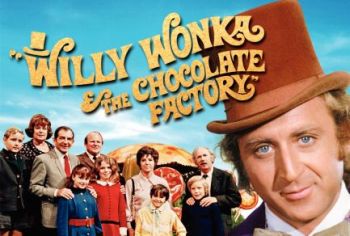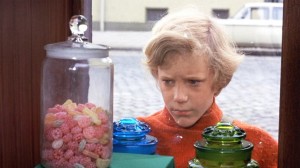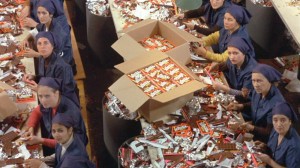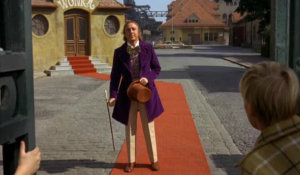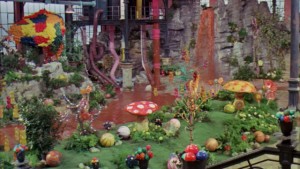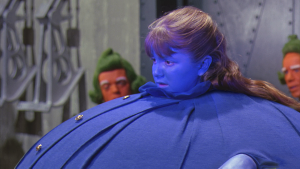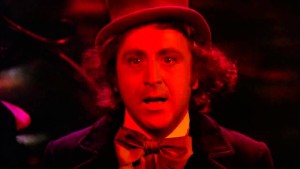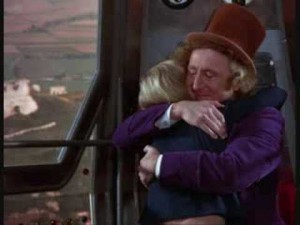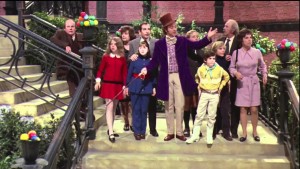“We are the music-makers, and we are the dreamers of dreams.” – Willy Wonka
When I heard the news of Gene Wilder’s passing, I immediately thought of his portrayal of Willy Wonka in Mel Stuart’s Willy Wonka & the Chocolate Factory (1971), which is the film adaptation of Roald Dahl’s 1964 novel Charlie and the Chocolate Factory. Wilder plays the mysterious and genius candy maker Willy Wonka, who has become a recluse from society and hides inside his chocolate factory. Although he has long banned workers from going into and out of his factory, his delicious and creative chocolates as well as other exotic candies keep on coming out. As such, he and his candies have become stuff of legend. In the film, he has finally decided to reopen and allow outsiders to enter and tour his factory. The catch is that only five people and an accompanying guest will be allowed the great honor. In a brilliant method to randomly select those individuals, he has placed five Golden Tickets in five random candy bars. The lucky people that find the tickets will be granted entry into the factory and receive a lifetime supply of chocolate. The story follows the young and selfless Charlie Bucket who hopelessly dreams of defying the odds and finding one of the tickets. Of course, he does it and we follow him, four other children, and their adult chaperones as they explore the fantastic and surreal yet dangerous factory of Willy Wonka. Interestingly, the movie was a flop when it was first released in 1971. However, its popularity increased in the mid-1980s due to television broadcasts and home video sales. Retrospectively, it has become one of the most beloved children’s movies and is critically acclaimed. I remember it fondly as part of my childhood. It is one of the few stories I remember vividly despite not having watched it in a very long time [until I watched it again after Wilder’s death]. As a comparison, I had watched the remake, Charlie and the Chocolate Factory (2005) starring Johnny Deep as Willy Wonka, much more recently; I barely remember anything about it. For me and many fans, the original film is the official film adaptation and the only one we recognize. Although the book is focused on Charlie as the main character, Wilder’s Willy Wonka is clearly the dominant character in the original film adaptation. As Willy Wonka & the Chocolate Factory became a cult film, Wilder’s Willy Wonka became an iconic role that defines his career. It is a great children’s movie because it challenges the limits of imagination with the impossible wonders inside Wonka’s factory, encourages good behavior while strongly discourages poor vices for kids, and features memorable musical numbers. On the other hand, the film and especially Wonka also display some very dark, sadistic undertones that I did not really understand when I was younger. Now that I am an adult, the incredible contrasts make a look back at the movie extremely interesting.
The movie begins with children running into Bill’s Candy Shop. As the local candy shop owner, he knows what item every child loves and hands it to him before he even asks for it. Eventually, he shows his eager customers Wonka’s latest and greatest chocolate invention, a “Scrumdiadilyumptious” Bar. Amazed by how Wonka seemingly comes up with an endless number of unique and delicious candies, one of the children asks “How does he do it?” Bill fittingly answers “My dear boy, do you ask a fish how it swims? Or a bird how it flies? No sirree, you don’t! They do it because they were born to do it. Just like Willy Wonka was born to be a candy man, you look like you were born to be a Wonkarer.” It cues the first musical number of the film as Bill sings the iconic song, “The Candy Man”. As we know, it starts with “Who can take a sunrise? Spring it with dew. Cover it in chocolate and a miracle or two. The Candy Man” and ends with “The Candy can cause he mixed it with love and makes the world taste good. And the world tastes good cause the candy man thinks it should…” From the opening scene, Willy Wonka is painted as a mythical figure, a God of Candy. In contrast, Charlie Buckets stands outside of the shop and can only peer in longingly at the candy. Afterwards, he stops in front of the closed gates of the Wonka Factory to wonder what magic lies within. Charlie comes from modest means. He has begun working a paper route to help his single, widowed mother take care of him and his four bedridden grandparents. His grandparents are Grandpa George, Grandma Georgina, Grandma Josephine, and Grandpa Joe (Jack Albertson). Watching the movie again as an adult, I laugh at how unoriginal the writers were with the names. In addition, Mrs. Bucket notes that the grandparents have been bedridden for twenty years. Of course, it is highly unlikely that four elderly grandparents, who are that sick, could survive for so long. Nevertheless, it is a children’s movie. When I was young, it drove home the point that his grandparents are very frail. Charlie is portrayed as the ideal child. While most children have desires and are self-centered, Charlie is hardworking and selfless. Instead of using his paper route money to buy things he wants, he uses it to support his family such as buying a loaf of bread. Moreover, he offers to use the rest of the money to pay for Grandpa Joe’s vice, tobacco. It is fascinating to see how tobacco was basically the equivalent of candy for grownups in 1971. Of course, the perception of tobacco has completely changed as society learned more about its deadly side effects. A child offering his grandparent tobacco would never occur today.
Naturally, Charlie’s closest connection is with his Grandpa Joe. Later at night, they have a private conversation. Grandpa Joe tells Charlie the story about Willy Wonka and his factory. As part of corporate espionage, especially from the nefarious Slugworth, spies were sent in disguised as workers to steal Wonka’s secrets. Accordingly, Wonka was forced to close the factory and disappear. After three years, the gates remained closed but the factory turned back on and started to produce candies again. Adding to the mystery, thousands must be helping him but the gates remain closed so his workforce is unknown. As such, how did Wonka find the manpower without anyone knowing about it? Over time, Wonka’s secrecy and total silence only continues to build the world’s curiosity about him and his factory. If a high profile public figure does not provide answers, others will make up stories and rumors to fill the void. It actually amplifies his legend. While Charlie is in school and helping his teacher, Mr. Turkentine, with a science experiment, a commotion in the hallways interrupts the class. When Mr. Turkentine opens the classroom door to ask a student what is going on, he answers that Willy Wonka is opening his factory again but only for five lucky individuals who find the Golden Tickets he has put inside five candy bars. Consequently, everyone is rushing to the candy stores. The same pandemonium has taken over the world. As a marketing ploy, it is beyond genius. The film adds in hilarious scenes for comic relief throughout the search for the tickets that demonstrate the insanity of the phenomenon. For example, a patient is telling his psychiatrist that he is having dreams and cannot stop himself from believing them. Accordingly, the doctor reminds his patient “I’ve told, Mr. Hofstedder, to believe in one’s dreams is a manifestation of insanity. And the sooner you accept this, the sooner you will get well.” However,Mr. Hofstedder continues to talk and say that he saw the Archangel appear and whisper him the location of a Golden Ticket. Ironically, the prospect of finding a ticket overwhelms the sanity of the psychiatrist and he shouts at his patient to tell him the location. Next, a technician at a computer lab develops a supercomputer/ artificial intelligence that can determine the location of a ticket. Hysterically, the computer refuses to answer because it would be cheating and is very sarcastic when the technician tries to convince it to disclose the information. After the fourth ticket is found, the world is desperate to find the final ticket. Remaining boxes of Wonka bars are auctioned at outrageous prices. In one situation, a woman’s husband is kidnapped. Naturally, she frantically tells the authorities she will give anything to get him back. When the kidnappers ask for her box of Wonka bars as the ransom, she seriously and hilariously asks how much time she has to think about it and respond. In my opinion, these examples are meant more for adults and I did not fully appreciate how funny they were until I watched the movie again.
The tickets are found by children around the world. The first ticket is discovered by Augustus Gloop (Michael Gloop) from Duselheim, West Germany. He says very little but eats a lot. It is genetic as his father eats the tip off a microphone while they are interviewed by reporters during dinner. The second ticket comes under the possession of British girl, Veruca Salt (Julie Dawn Cole). She is a complete brat whose father indulges her every desire. Naturally, she wants a Golden Ticket. Of course, the odds of finding a ticket is like winning the lottery. For a father who bends over backwards to ensure his daughter is happy at all times, it is his worst nightmare. He owns a peanut factory and has ordered his workers to open candy bars instead of shelling peanuts for five full days. They are opening nineteen thousand bars an hour and have opened seven hundred and sixty thousand bars in total. Despite the tremendous effort, Veruca could care less and throws a temper tantrum because she does not have a ticket yet. Julie Dawn Cole does a tremendous job playing the unbelievably, unlikeable spoiled girl. Shortly afterwards, one of the workers finds a ticket to the relief of Mr. Salt. The third child that finds a ticket is Violet Beuregarde in Miles City, Montana. She has a bad habit of chewing gum all the time. In fact, she has disgustingly been chewing the same piece of gum for three months. Of course, she switched to candy bars after Wonka begun his contest. Her father is also an interesting fellow. He is a politician and car salesman. Naturally, he is an opportunist. He shamelessly plugs his business on television when reporters try to interview Violet. Like father, like daughter. Violet is also a self-promoter and fast talker. The fourth child is Mike Teevee from Marble Falls, Arizona. He is a television addict and gun enthusiast. When reporters try to interview him, he does not care to be bothered or answer because one of his favorite shows is on. Afterwards, it leaves one remaining ticket.
While most people in the world are opening ridiculous numbers of candy bars, Charlie cannot afford to do so. Again, the odds are so overwhelmingly against anyone finding them anyway. In an attempt to comfort Charlie, his mother explains it perfectly “there are a hundred billion people in this world, and only five of them will find Golden Tickets. Even if you had a sack full of money you probably wouldn’t find one. And after this contest is over, you’ll be no different from the billions of others who didn’t find one.” In reality, it is a fool’s errand and a complete waste of money to buy and open many candy bars. The odds are so low that you need a miracle. Technically, his odds are lower than most but every person’s odds are virtually zero regardless. It is similar to the lottery. Like the lottery, some people do defy the odds and hit. It is why people foolishly spend a lot of money on it because they do not fully understand the odds. The concept is “all you need is a dollar and a dream”. For Charlie, all he needs is a little hope and candy bars. Grandpa Joe reinforces the idea when he tells Charlie he has better odds because he wants it more than anyone else. In real life, it is completely irresponsible to feed a child false hope. However, it works in the movie. It is fine for children to believe in the impossible and to dream big dreams. They will have plenty of time to be a realist and skeptic when they grow up. Charlie’s first opportunity is his birthday. His grandfathers chip in for a candy bar but it obviously does not have a ticket. Later, Grandpa Joe uses the money Charlie gave him for tobacco to buy a second bar. Again, no ticket. Hope appears to be over when the fifth ticket is supposedly found in South America. However, it is a hoax. Of course, it is a movie and fate intervenes. When Charlie finds some change in a sewer gutter, he goes to Bill’s Candy Shop to buy a candy bar. After he finishes one, he thoughtfully decides to buy an extra candy bar for Grandpa Joe. When news of the hoax spreads, Charlie checks the bar and finds the fifth and final ticket. A crowd starts to swarm him. Luckily, Charlie’s boss pulls him from the crowd and tells him to run straight home. When someone wins the lottery or a contest like Wonka’s Golden Tickets, it can seem like fate is intervening. Since it is a movie about one of the five children that find it, I can accept the premise. Nevertheless, I appreciate that they intelligently explain the odds and improbability of winning. After each child finds a ticket, a sinister looking man [allegedly Slugworth] appears and whispers something into his ears. On Charlie’s way home, he runs into the same man and we learn his evil plan. He offers Charlie enough money to buy a home and take care of his family in exchange for stealing one of Wonka’s newest inventions while he is in the factory, an Everlasting Gobstopper, so his factory can reverse engineer and copy it.
Every holder of a Golden Ticket is allowed one guest to accompany him. Naturally, Charlie wants Grandpa Joe to go with him. Even though Grandpa Joe has not walked in twenty years, he finds a way to do so. He stumbles at first before finding the will to walk. Of course, the idea of an elderly person walking for the first time in twenty years is ludicrous. Astronauts have difficulty after floating in space for far less time. On the other hand, I did not know any better when I was a kid. For children watching the movie, it does add to the drama of the special moment. As for the other children, the pairs include Augustus Gloop and his mother Mrs. Gloop (Ursula Reit), Veruca Salt and her father Henry Salt (Roy Kinnear), Violet Beauregarde and her father Sam Beauregarde (Leonard Stone), and Mike Teevee and his mother Mrs. Teevee (Dodo Denney). The tour group lines up in front of the closed gate to the factory as the world anticipates and watches the appearance of Willy Wonka. Wonka makes a dramatic entrance. He walks out with a cane to look old and frail. As he nears the gate, he appears to trip and fall but does a flip to the amusement of the adoring crowd. Wonka is colorful, charismatic, and charming showman. He is very welcoming and complimentary to his guests when he greets them individually. Of course, first impressions can be deceiving. When they enter the factory, he asks the participants to sign a contract first. Naturally, a person should never sign anything without reading through it thoroughly. Wisely, Mr. Beauregarde objects and says his lawyer needs to review it first. Likewise, Mr. Salt shares the same sentiment. Naturally, children are not concerned with such trivial stuff like contracts and law. They just want to go in the factory. Once Wonka declares that they must sign the contract to enter, the adult guardians quickly succumb to the pressure from their children to sign. Nevertheless, it is an indicator Wonka may be up to something.
He also reveals himself to be a bit of a prankster. When he begins the tour, he brings his guests into a trap room with seemingly no way out. Obviously, they begin to panic. It is a trick room where the exit is the entrance but opening the door again leads to a new corridor. Wonka’s entire factory is comprised of trick and trap corridors and rooms. As he describes it, “Oh, you can’t get out backwards. You’ve gotta go forwards to go back.” Consequently, it is impossible to navigate without a guide who has knowledge of the maze. Moreover, it is perfect for deterring espionage as any spy would be lost in the factory forever. Eventually, Wonka leads his guests to the highlight of factory, his Chocolate Room. It is a Land of Candy. Everything is unbelievable, impossible, and edible. It is the epitome of every child’s fantasy paradise, an edible playground. It features a chocolate river and chocolate waterfall. There are trees that have gummy bears and other threes with different candies dangling and within them. There are giant mushrooms with creams inside, lollipops and candy canes growing out of the ground like plants, flowers that are an edible teacup with tea inside them, and much more. It is the most memorable scene in the movie. Fittingly, Wonka sings “Pure Imagination”. The name of the song is the perfect description of the room and scene because they are totally surreal. Like the children in the film, I wanted desperately to go into the room and enjoy its wonders. I still do. When my brother and I were kids, we were inspired by the movie and used our own imaginations to picture our stuffed animals living in a world that is completely built with edible sweets. As Wonka begins his musical number, he is purposely deliberate and slow. In addition, he uses his cane to block any of the children who want to rush the delights of the Chocolate Room before Wonka allows it. As a result, excitement and anticipation only builds. Once he releases them to explore, they immediately scatter and quickly eat as much as they can. During this scene, the Oompa Loompas also make an appearance. They are short men with orange skin and green hair. Wonka found them in Loompaland where they were being eaten by exotic creatures. When Wonka offers safety by living in his factory, they obviously accept. It answers the question of who has been helping Wonka work his factory the entire time. When Wonka needs their help, he uses a small flute to summon them. While no other section of the factory tops the Chocolate Room, there are plenty of wonderful and unimaginable [if Willy Wonka did not imagine them] things to see on the rest of the tour. After the Chocolate Room, the group visits the Inventing Room where Wonka has created the Everlasting Gobstopper, a candy that continually changes color and flavor yet never gets smaller. He is also working on exploding candy and a three course dinner chewing gum. Of course, these candies are impossible. Next, they go to the Egg Sorting Room where they see large geese that lay huge chocolate eggs for Easter. The end at the tour brings them to the Television Room where Wonka is working on Wonkavision. It will allow Wonka to send chocolate bars through the television by shrinking a large chocolate bar to a regular size one by the time it arrives to a television set. Astonishingly, the viewer can pull the bar from the television and eat it. Along the way to these rooms, we also see wallpaper you can lick and Fizzy Lifting drinks that cause a person to fly.
Of course, all those inventions are amazing and phenomenal. Nevertheless, the factory is also a dangerous place. There are traps around every corner that will punish the children for some of their vices. The first victim is Augustus Gloop. It is obvious that his flaw is gluttony. When he is indulging himself in the Chocolate Room, he begins drink the chocolate from the river despite Wonka’s pleas to stop. Eventually, he falls in the river. To make matters worse, he cannot swim. After a tense moment when they worry he might have drowned, he reappears in a suction tube but is stuck because he is too wide. Inevitably, the pressure from the chocolate pushes him through the tube to the fudge room. However, there is a risk he could go all the way to the boiler where he would be burned alive. The next victim is Violet. She has the disgusting habit of chewing gum all the time. When she sees Wonka’s three course dinner chewing gum, she cannot resist her urge to try it despite his warnings that it is still in the experimental stage. Naturally, she triggers the defect. When she gets to the blueberry pie dessert portion of the gum, she begins to turn blue and expand into a giant ball because of the juice building inside her. Accordingly, Wonka instructs the Oompa Loompas to roll her to the juicing room to drain her before she explodes. Obviously, Veruca’s shortcoming is that she is a completely spoiled brat. Throughout the tour, she consistently becomes infatuated with items within the factory (e.g. Oompa Loompa, a boat, etc.) and demands that her father buy it for her. When she sees the geese in the Egg Sorting Room, she adamantly demands that her father buy her one and buy her one immediately in that instance. Of course, she has never been told no in her life. As a result, she completely flips out and goes on a diatribe when Wonka refuses to sell them one. Underneath the geese, there are scales that measure if the chocolate eggs are good or bad. When Veruca steps on top of the scale, it predictably concludes she is a bad egg and drops her through the chute that leads to the garbage chute. Wonka also notes that the furnace is lit every other day to incinerate the garbage. Upon hearing this fact, her father jumps in after her to save her. Obviously, a parent shares a lot of the blame for spoiling a child. As such, it is fitting that Mr. Salt shares the same fate as his daughter. Next, Mike Teavee’s vice is that he watches way too much television. He cannot resist having the Wonkavision ray used on him to shrink him and send him into a television set. Of course, he is now the size of a figurine and needs to be pulled by a taffy stretcher. After each of the children fall for the traps in the factory, the Oompa Loompas sing a jingle to emphasize the important lessons to be learned by the downfalls of each child.
When I was a child, I did not think much about the fates of the children. They were being bad and were punished. Any kid can understand being disciplined. I did not reconsider my views on these scenes in the film until I was in college. When I discussed the film with a couple of friends, they noted that they hated the movie because of the terrible fates it inflicted on the children. Gluttony, chewing gum excessively, being spoiled, and watching too much television are terrible habits that parents should teach their kids to avoid or correct. Nevertheless, it would not justify potentially murdering a child via incineration through boiler or furnace, causing them to explode which will kill them, or shrinking them into the size of a figurine permanently. These punishments are not only cruel and unusual. They are extremely sadistic. It is horrifying to even consider that anyone would try to murder or inflict such permanent trauma on a child. In current times, society is rightfully sensitive about any physical or emotional abuse of a child. It is a fair question to ask whether this film would be seen as acceptable by the general public if it were released today. Of course, the story exists in a fantasy world that only mimics the real world until the characters enter Wonka’s factory. Inside, there are chocolate rivers and waterfalls, candy trees, impossible candies, shrink rays, etc. The laws of physics and human biology are not the same in the world of Willy Wonka & the Chocolate Factory as they are in the real world. In addition, a child simply would not comprehend and interpret the fates of the children in the same manner that an adult would. For example, as an adult, I conjure images of torture and war crimes when I hear boiler and furnace. When a kid views and hears the same thing, it is the equivalent of watching a cartoon character triggering an explosion, flying through the air, and reappearing unharmed later (i.e. Wile E. Coyote). In my opinion, it is meant to be dark humor. In the end, it is so ridiculous [like a G rated Quentin Tarantino children’s story] that it is meant to be funny for children. I definitely interpreted it as such when I was younger.
While Wonka exhibits a lot of charm and charisma as the sweet candy man initially, he reveals a darker side of him throughout the film. He is very sarcastic as well as not empathetic and apathetic to the plight of the children while their lives are at risk. When Augustus Gloop falls into the chocolate river, Wonka completely disregards any thought of Augustus’s well-being and safety. He is only distraught because his chocolate is tainted by the touch of a human being. Naturally, Mrs. Gloop is freaking out because her son cannot swim and could drown. Although she pleads with Wonka to do something, Wonka uncaringly and nonchalantly says “Help. Police. Murder.” When Augustus is stuck in the suction tube, Wonka even appears to take delight in Augustus’s torture: “The suspense is terrible. I hope it’ll last.” Even though he informs Mrs. Gloop that her son could be killed by boiler, he stills shows no emotion or concern for his safety. He only plays his flute and instructs an Oompa Loompa to take Mrs. Gloop to her son and continues on with his tour like nothing happened. There are also indications that he purposely set the traps to prey on some of the children’s vices. For example, Violet loves gum. It may not be a coincidence that Wonka has an experimental gum with a fatal flaw. As she moves through the three courses and to the dessert finale, Wonka sits and quietly and sarcastically mumbles “Stop, don’t…” He knows what will happen to Violet. She will turn blue and expand from juice buildup once she gets to dessert. Any rational and compassionate person would desperately and forcefully try to stop her. For all these reasons, Wonka clearly lacks empathy for other people. In his defense, he had not socialized with another human being for years. Moreover, his defining feeling for other people are disdain and betrayal because of the spies who stole from him. As he was a recluse in his factory and secluded from society, he likely harbored those ill feelings for years that caused his lack of care for them.
While I can understand apathy for other people, planning and/or delighting in their suffering is indefensible. For this reason, Wonka is definitely a sadistic character. Is Wonka some kind of child serial killer? I still do not think so. When Charlie inquires about the fates of the other children at the end of the movie, Wonka answers “My dear boy, I promise you they’ll be quite all right. When they leave here, they’ll be completely restored to their normal, terrible old selves. But maybe they’ll be a little bit wiser for the wear.” Consequently, I believe he put in safeguards to ensure that the children would live. For example, Augustus Gloop was never going into boiler and the furnace was definitely not turned on in the garbage chute when Veruca fell through. Nevertheless, Wonka wanted to simulate the fear of death to teach the children lessons. While he is not an attempted murderer, he basically believes in waterboarding/ torturing children to teach them. Of course, it is a disturbing characteristic. When I watched this film as a child, I only saw the fun and charming side of Wonka. As a result, it was my enduring feeling and memory about him. I just did not fully comprehend the dark side of him until I grew up. Gene Wilder does an amazing job playing both sides of Wonka. It is a much more complex and intriguing character than the cartoonish, Michael Jackson like Wonka that Johnny Depp portrayed in the remake, Charlie and the Chocolate Factory. Wilder’s Wonka is a fascinating character to retrospectively analyze when you get older.
Once Charlie is the final child remaining, it appears he will be the winner of the grand prize: the lifetime supply of chocolate. However, he was not a perfect guest either. Earlier in the film, Grandpa Joe and he decided to lag behind the tour and try the Fizzy Lifting drinks. While they enjoy the feeling of flying at first, they narrowly escape being cut into pieces by the fans near the ceiling until they realize burping causes them to descend back towards the ground. Even though they believe Wonka did not know about it, he knew. When Grandpa Joe asks about the chocolate prize, Wonka completely lashes out at them. He points out that the contract, they signed at the beginning of the tour, dictates their rights to the prize are nullified because “You stole Fizzy Lifting Drinks. You bumped into the ceiling which now has to be washed and sterilized, so you get nothing!” Naturally, Grandpa Joe is incensed with Wonka’s reaction and blasts him “You’re a crook! You’re a cheat and a swindler! That’s what you are. How can you do a thing like this? Build up a little boy’s hopes and then smash all his dreams to pieces. You’re an inhuman monster!” It would have been a very dark twist and ending if Wonka turned out to be just a sadistic monster. Of course, the film is still ultimately a children’s story despite the dark undertones. Grandpa Joe is obviously incensed with Wonka’s response and vows vengeance by taking Slugworth’s offer to sell him the Everlasting Gobstopper. Nevertheless, Charlie is truly incorruptible. Even though Wonka has behaved cruelly, Charlie knows it is still wrong to purposely harm another person. For this reason, he lays the Everlasting Gobstopper in front of Wonka to return it. Immediately, Wonka changes his tone and is overjoyed that Charlie passed his ultimate test. The actual big twist in the entire story is that the entire contest and tour was a brilliant plan by Wonka to look for a successor. He is getting older and knows he cannot run the factory and take care of the Oompa Loompas forever. He explains he specifically needed a child because “A grownup would want to do everything his own way, not mine. That’s why I decided a long time ago I had to find a child. A very honest, loving child to whom I can tell all my most precious candy making secrets.” Of course, he also reassures Charlie that his mother and remaining grandparents will move into the factory with him and live happily ever after. With a final thrilling trick, he brings Charlie and Grandpa Joe to a special elevator that crashes through the glass ceiling and flies above the beautiful city below. It is a little sappy but a great ending to a children’s story.
Come with me
And you’ll be
In a world of pure imagination
Take a look
And you’ll see
Into your imagination
We’ll begin
With a spin
Traveling in
The world of my creation
What we’ll see
Will defy
Explanation
If you want to view paradise
Simply look around and view it
Anything you want to, do it
Want to change the world?
There’s nothing to it
There is no
Life I know
To compare with pure imagination
Living there
You’ll be free
If you truly wish to be
If you want to see magic lands
Close your eyes and you will see one
Want to be a dreamer, be one
Anytime you please and please save me one
– Josh Groban’s “Pure Imagination”
About Pat Wong
Patrick is a contributor for Rookerville. He is an avid sports fan. Before joining Rookerville, he was part of a defunct New York Yankees message board, NYYankeefans, where he was its top poster and was inducted in its Hall of Fame for his contributions. Patrick is also a passionate fan of movies. He has enjoyed reading movie reviews over the years and is excited about the opportunity to review movies. Patrick is also a passionate foodie. He is Yelp Elite for three years in a row and shares his great finds in New York and his travels.

